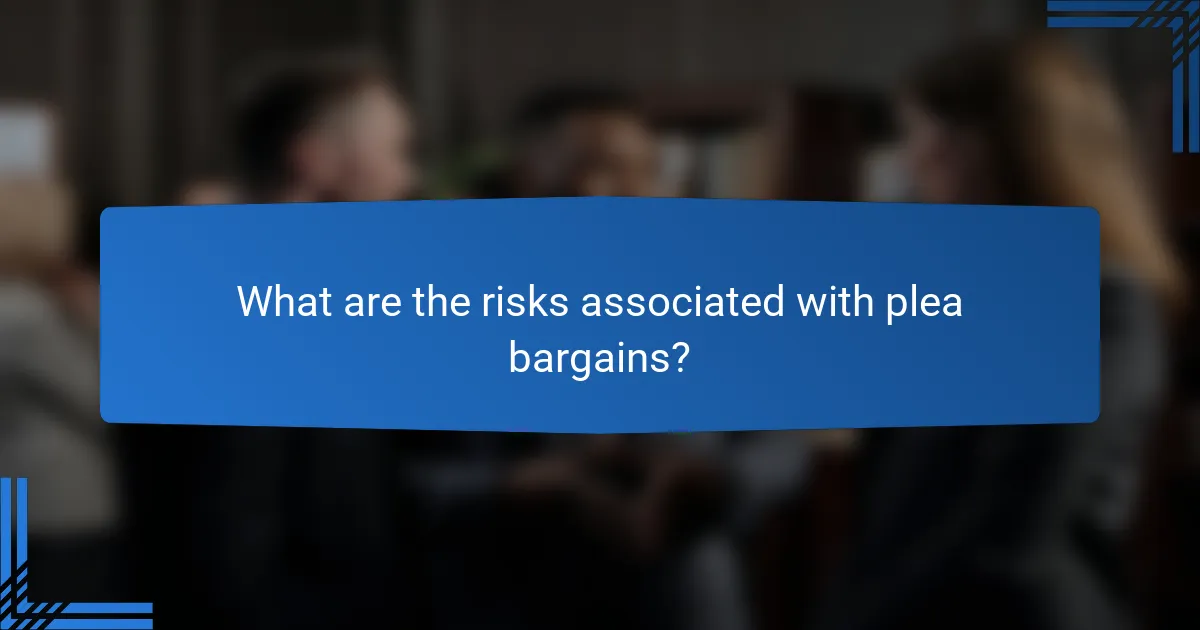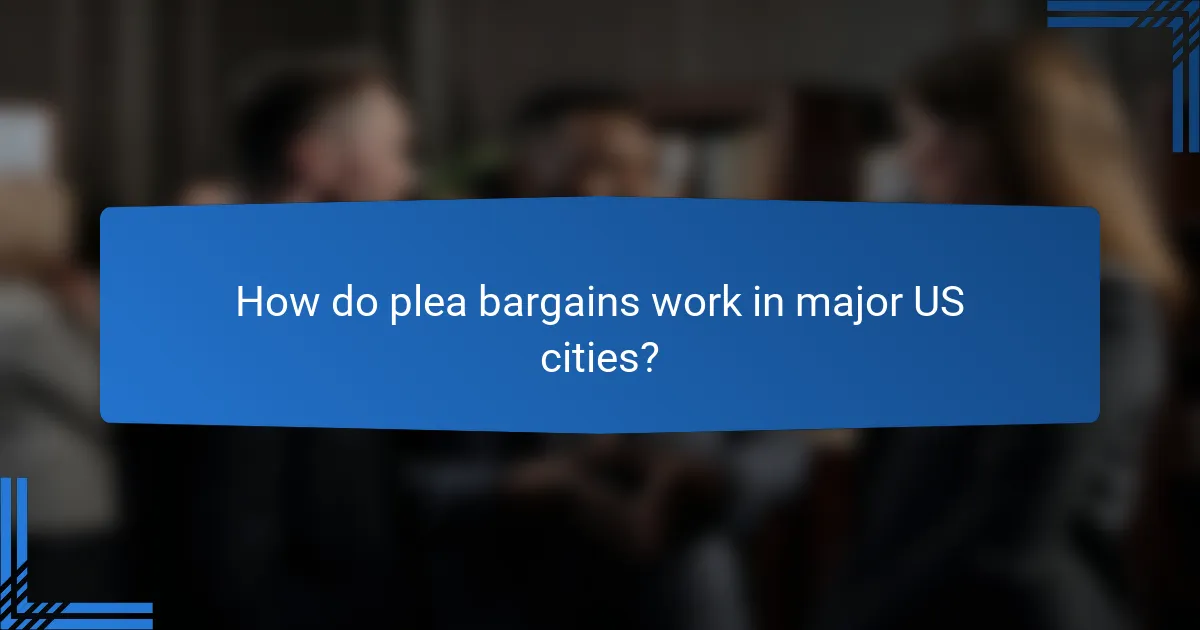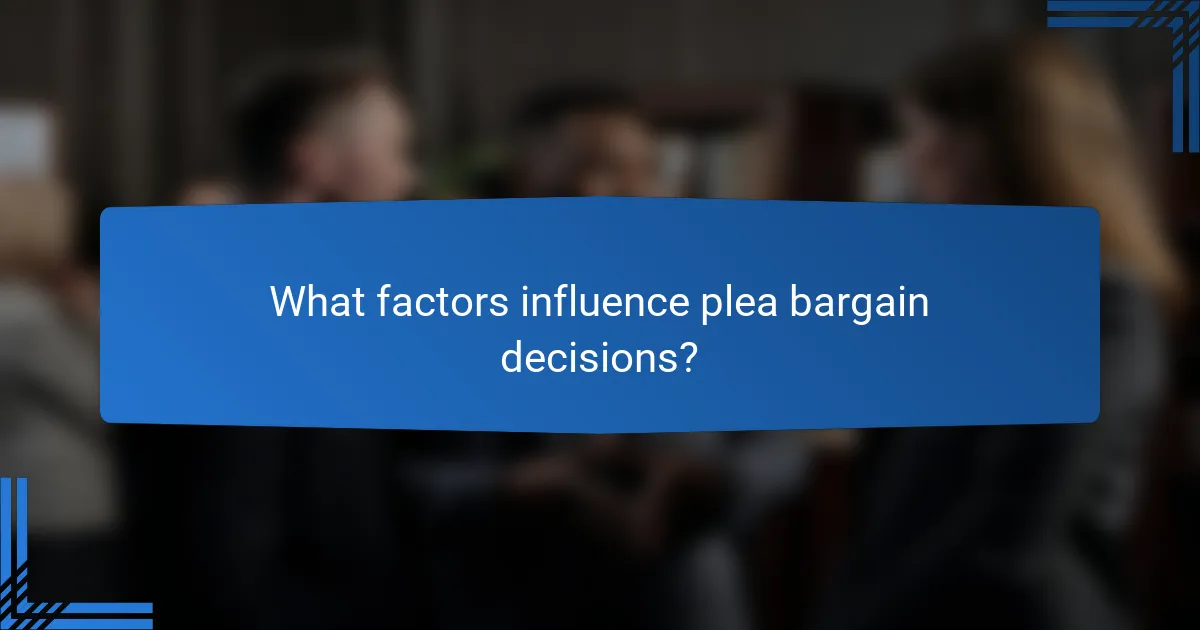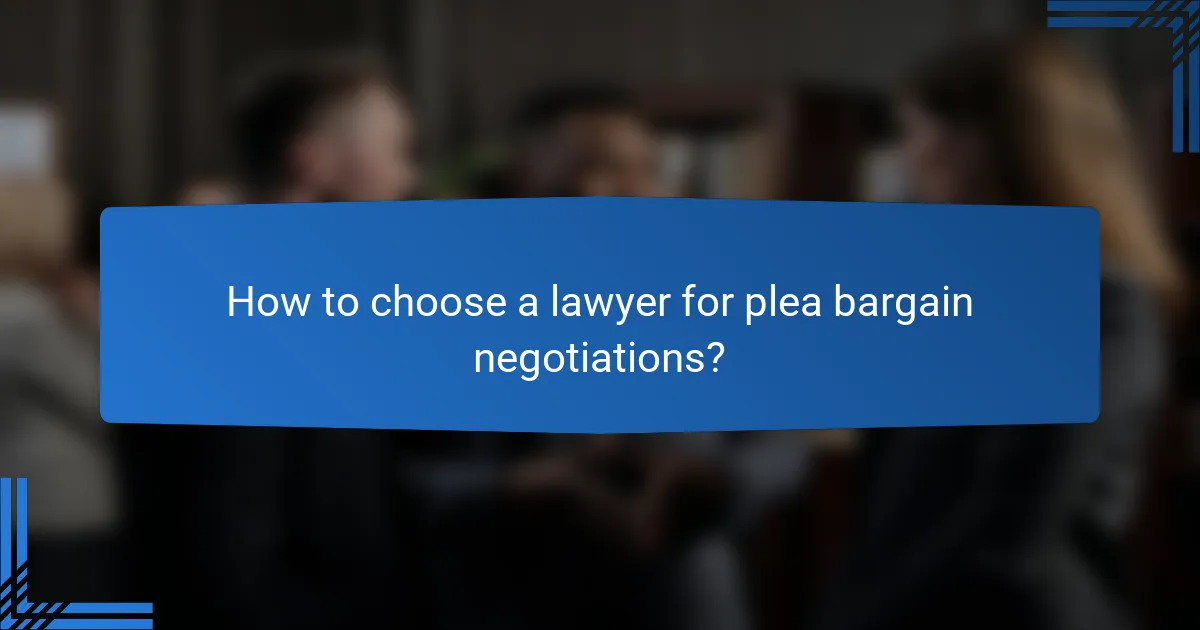Plea bargains play a crucial role in the U.S. legal system by allowing defendants to plead guilty to lesser charges in exchange for reduced sentences or the dismissal of other charges. While they offer benefits such as quicker resolutions and lower court costs, they also pose risks, including the potential for wrongful convictions and pressure on defendants to accept deals. Understanding the dynamics of plea bargains is essential for navigating the complexities of criminal justice.

What are the benefits of plea bargains in the United States?
Plea bargains offer several advantages in the U.S. legal system, including reduced sentences, lower costs for the court, and quicker case resolutions. These agreements can benefit both defendants and the judicial process by streamlining proceedings and minimizing the emotional toll on victims.
Reduced sentences
Plea bargains often result in reduced sentences for defendants, as they may plead guilty to lesser charges in exchange for a more lenient punishment. This can lead to significantly shorter prison terms compared to the potential penalties if the case went to trial. For example, a defendant facing a lengthy sentence might negotiate a plea that results in probation or a few years in prison instead.
However, defendants should be aware that accepting a plea deal may still carry long-term consequences, such as a criminal record, which can affect employment and housing opportunities. It’s crucial to weigh these factors before agreeing to a plea bargain.
Lower court costs
Plea bargains help lower court costs by reducing the number of cases that go to trial, which can be expensive and time-consuming. Trials require significant resources, including court personnel, jurors, and facilities. By resolving cases through plea deals, courts can allocate their resources more efficiently.
For instance, a plea bargain can save the court system thousands of dollars per case, allowing funds to be redirected to other critical areas, such as public defense or rehabilitation programs.
Faster resolution of cases
Plea bargains facilitate a quicker resolution of cases, benefiting both the legal system and the involved parties. Trials can take months or even years to conclude, while plea agreements can often be settled in a matter of weeks. This speed can alleviate the backlog of cases in the judicial system.
Additionally, faster resolutions can provide closure for victims and their families, allowing them to move on with their lives sooner rather than waiting for a trial to conclude.
Less stress for victims
Plea bargains can reduce the stress and emotional burden on victims by minimizing their involvement in lengthy court proceedings. Trials can be traumatic experiences for victims, requiring them to relive painful events. A plea agreement can spare them from testifying and facing the defendant in court.
Moreover, knowing that a resolution is reached can provide victims with a sense of justice and closure, even if the outcome is not what they initially desired.
Increased case efficiency
Plea bargains contribute to increased case efficiency by allowing the legal system to resolve cases without the extensive time and resources required for a trial. This efficiency helps maintain the flow of the judicial process, ensuring that cases are handled in a timely manner.
By encouraging defendants to accept plea deals, the system can focus on more serious cases that require trial, ultimately enhancing the overall effectiveness of the legal process.

What are the risks associated with plea bargains?
Plea bargains come with several risks that can significantly impact defendants and the justice system. These risks include the potential for wrongful convictions, pressure on defendants to accept deals, limited options for appeal, and negative effects on public perception of the legal process.
Potential for wrongful convictions
Plea bargains can lead to wrongful convictions, particularly when defendants feel compelled to accept a deal to avoid harsher penalties. Innocent individuals may plead guilty to crimes they did not commit simply to secure a more lenient sentence or to avoid the uncertainty of a trial. This risk is heightened in cases where the evidence against the defendant is circumstantial or weak.
For example, a defendant facing a lengthy prison sentence might accept a plea deal for a significantly shorter term, even if they are innocent, due to fear of the trial process and potential outcomes. This can result in a miscarriage of justice that affects not only the individual but also the integrity of the legal system.
Pressure on defendants
Defendants often face immense pressure to accept plea bargains, which can lead to hasty decisions. Prosecutors may present plea deals as the only viable option, emphasizing the risks of going to trial, such as longer sentences or additional charges. This pressure can be overwhelming, especially for individuals unfamiliar with the legal system.
Moreover, the emotional and financial toll of prolonged legal battles can push defendants toward accepting a plea deal, even if it may not be in their best interest. Understanding this pressure is crucial for defendants and their legal counsel when considering their options.
Limited appeal options
Once a plea bargain is accepted, defendants typically waive their right to appeal the conviction. This limitation can be problematic, as it removes the opportunity to challenge any potential errors made during the plea process or the underlying case. Defendants may later realize that the deal was not in their best interest but find themselves without recourse.
In some jurisdictions, this means that even if new evidence emerges that could exonerate a defendant, the plea agreement prevents them from seeking a retrial. It is essential for defendants to fully understand the implications of accepting a plea deal before proceeding.
Impact on public perception
Plea bargains can negatively influence public perception of the justice system. Many people may view plea deals as a way for defendants to “get away” with crimes, undermining the seriousness of the offenses. This perception can lead to a lack of trust in legal outcomes and the belief that justice is not being served.
Furthermore, high-profile cases involving plea bargains can attract media attention, shaping public opinion and potentially influencing future cases. It is important for legal professionals to communicate the rationale behind plea deals to help mitigate misunderstandings and foster a more informed public perspective.

How do plea bargains work in major US cities?
Plea bargains are agreements in criminal cases where the defendant pleads guilty to a lesser charge in exchange for a more lenient sentence or the dismissal of other charges. This process varies by jurisdiction but generally involves negotiations between the defense and prosecution, aiming to resolve cases efficiently while reducing the uncertainty of trial outcomes.
Los Angeles plea bargain process
In Los Angeles, the plea bargain process typically begins with the defendant’s attorney negotiating with the prosecutor. The goal is to reach an agreement that may involve a reduced charge or sentence. Factors influencing these negotiations include the severity of the crime, the defendant’s criminal history, and the strength of the evidence against them.
Defendants in Los Angeles should be aware that accepting a plea deal often results in a quicker resolution compared to going to trial, which can take months or even years. However, they should carefully consider the implications of pleading guilty, as it may affect future employment opportunities and civil rights.
New York City plea bargain statistics
In New York City, plea bargains account for a significant majority of criminal case resolutions, with estimates suggesting that around 90% of cases are settled through this method. This high percentage highlights the efficiency of plea deals in managing the court system’s caseload.
Statistics indicate that defendants who accept plea bargains often receive lighter sentences compared to those who go to trial. However, the exact outcomes can vary widely based on the nature of the charges and the specific circumstances of each case.
Chicago plea bargain trends
In Chicago, recent trends show an increasing reliance on plea bargains, particularly in response to a backlog of cases exacerbated by the pandemic. Prosecutors and defense attorneys are more frequently negotiating deals to expedite case resolutions and alleviate court congestion.
Defendants in Chicago should note that plea bargains can offer a chance to avoid the unpredictability of a jury trial. However, they must weigh the benefits against the potential long-term consequences of a guilty plea, including its impact on future legal matters and personal records.

What factors influence plea bargain decisions?
Plea bargain decisions are influenced by several key factors, including the severity of the charges, the defendant’s criminal history, the prosecutor’s discretion, and the victim’s input. Understanding these elements can help defendants and their legal counsel navigate the plea bargaining process effectively.
Severity of the charges
The severity of the charges plays a crucial role in plea bargain negotiations. More serious charges, such as felonies, may lead to harsher penalties if convicted, prompting defendants to consider plea deals more seriously to avoid lengthy sentences. Conversely, minor offenses might not warrant a plea bargain, as the risks of going to trial may be lower.
For example, a defendant facing a felony charge may be offered a reduced sentence in exchange for a guilty plea, while someone charged with a misdemeanor might receive a lesser penalty without needing to negotiate a plea. The potential consequences of the charges can significantly shape the bargaining process.
Defendant’s criminal history
A defendant’s criminal history is another critical factor in plea bargain decisions. Individuals with prior convictions may face stiffer penalties, making them more likely to accept a plea deal to mitigate potential consequences. In contrast, first-time offenders may have more leverage to negotiate favorable terms.
For instance, a defendant with a clean record might receive a more lenient offer, such as probation instead of jail time, while someone with multiple offenses may be pressured to accept a deal to avoid a lengthy prison sentence. Understanding how criminal history affects negotiations can help defendants make informed choices.
Prosecutor’s discretion
The prosecutor’s discretion significantly impacts plea bargain outcomes. Prosecutors have the authority to decide whether to offer a plea deal and what terms to include. Their assessment of the case’s strength, the defendant’s background, and the interests of justice all play a role in this decision-making process.
For example, a prosecutor may be more inclined to offer a plea bargain in cases with weak evidence or when the defendant shows genuine remorse. Conversely, if the prosecutor believes the case is strong and the crime is severe, they may be less willing to negotiate. Understanding the prosecutor’s perspective can help defendants and their attorneys strategize effectively.
Victim’s input
The victim’s input can also influence plea bargain negotiations. In many jurisdictions, victims have the right to express their views regarding the plea deal, which can affect the prosecutor’s approach. If a victim is opposed to a plea bargain, the prosecutor may be less likely to offer one or may seek more stringent terms.
For instance, if a victim advocates for a harsher penalty due to the crime’s impact, the prosecutor may prioritize the victim’s wishes in negotiations. Conversely, if the victim supports a plea deal, it may facilitate a more favorable outcome for the defendant. Engaging with victims’ perspectives can be a strategic element in the plea bargaining process.

How to choose a lawyer for plea bargain negotiations?
Choosing a lawyer for plea bargain negotiations involves assessing their experience, communication style, and understanding of local laws. A knowledgeable attorney can significantly influence the outcome of your case by negotiating favorable terms.
Experience with plea deals
When selecting a lawyer, prioritize their experience specifically with plea deals. An attorney who has successfully negotiated numerous plea bargains will understand the nuances of the legal system and the expectations of prosecutors.
Look for a lawyer who has handled cases similar to yours, as familiarity with the local court system can lead to better negotiation outcomes. Ask about their track record in achieving reduced charges or sentences through plea agreements.
Consider requesting references or testimonials from past clients to gauge their effectiveness in plea negotiations. A lawyer with a solid reputation in this area can provide peace of mind during a stressful time.
